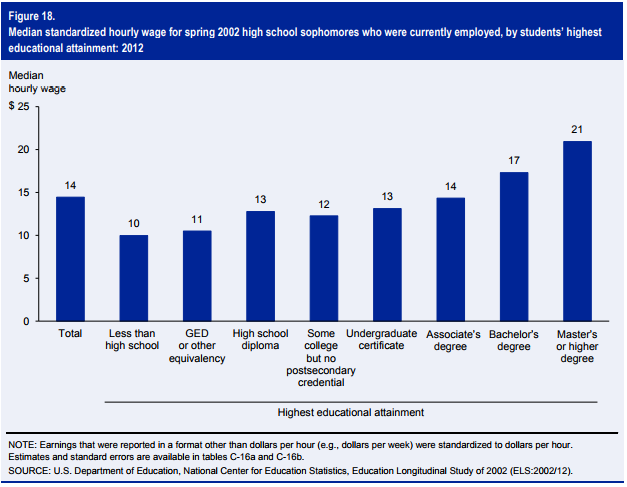You have /5 articles left.
Sign up for a free account or log in.

Getty Images
Those who graduated from college in 2008 often say it wasn’t the best time to be entering the working world. As graduates were searching for those first jobs, the economy was shedding them and the world was plunging into recession. If those prospects weren’t dire enough, many of those graduates were also carrying debt from student loans.
Those millennials, however unlucky, fared better than their non-college-educated counterparts, though.
A new longitudinal study from the National Center for Education Statistics -- the primary collector of student data on the federal level -- found these results by taking a sample of students who were high school sophomores in the 2001-02 academic year and tracking them through 2012. The nationally representative sample was measured for a variety of factors -- co-habiting, marriage, unemployment, underemployment, student debt carried -- but the economic breakdown in those categories between those who attained completed a postsecondary degree and those who didn’t is especially telling.

Great Recession
Although those who attended college fared better, the 2008 recession was not kind to the study’s cohort of millennials: 41 percent reported being unemployed at least once between 2009 and 2012, a number that cut across the range of those studied, considering 52 percent had achieved some sort of postsecondary credential, and 33 percent had attained a bachelor’s degree.
Even though the timing of graduating might not have been ideal, attaining a four-year degree was still a good economic move for these millennials, on average, according to the report, which attempted to control for outside factors in its economic modeling. Put simply, even in the face of a recession, going to college still paid off.
“Individuals with less education had higher unemployment rates, while those with more education had higher employment rates and were more likely to be working full-time,” the report stated.
By 2012, 78 percent of those who had earned a bachelor’s degree were working more than 35 hours a week. Eleven percent were working fewer than 35 hours, 5 percent were unemployed and 6 percent were out of the labor force.
Of the members of the cohort who only had high school degrees, 64 percent were employed 35 hours or more a week, with 12 percent working fewer than 35 hours -- similar to the number of those with a bachelor’s degree -- and 14 and 10 percent were unemployed and out of the labor force, respectively.
In addition to employment, earning power was also differentiated along educational lines. Those surveyed who had a bachelor’s degree earned, on average, $17 an hour. Those surveyed with a high school diploma earned, on average, $13. (The study also found disparities in pay when accounting for race and gender, as well as socioeconomic background.)
The study notes that it’s still early to be drawing overly expansive conclusions from its data, however.
“It is important to note that this section only addresses cohort members’ early career and labor market outcomes,” it reads. “At age 25-26, many individuals are just starting their careers; some are still enrolled in undergraduate or graduate studies; and others will return to school for additional training later in their careers.”
Still, as the study notes, early labor data is often correlated with later outcomes.
By 2012, 83 percent of those in the cohort were employed, 11 percent were looking for jobs and 7 percent were out of the work force.
Underemployment
The study offered two ways to measure underemployment: based on whether a person’s posted job requirement was less than what that person had, and whether the person’s job was related to what they studied in college.
Neither of these methods is perfect -- after all, 20 percent of those surveyed with associate degrees said they were working in a job that required a bachelor’s degree, and people switch careers and find different fields to work in other than their field of study -- but they’re correlated with underemployment.
As many as 35 percent of those surveyed with a bachelor’s degree were estimated to be potentially underemployed by the first measure, with 16 percent working in a job that only required an undergraduate certificate, and 19 percent working in a job that only required an associate degree. Only 44 percent of those with a bachelor’s degree reported working in a field that was closely related to their major.
Ultimately, the results of the study point to the largely agreed-upon takeaway that -- although economic uncertainty remains, policy prescriptions surrounding higher education abound and debt often has to be taken on in the process of seeking a degree -- those with college degrees go farther economically.








